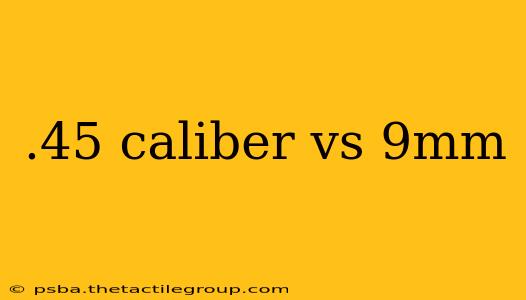Choosing the right caliber for self-defense or personal protection is a critical decision, and the debate between the venerable .45 ACP and the widely popular 9mm often dominates the conversation. Both cartridges have a long and storied history, boasting legions of loyal proponents. This in-depth comparison will examine their strengths and weaknesses, helping you make an informed choice based on your specific needs and preferences.
Ballistics: Power vs. Capacity
The core difference between the .45 ACP and 9mm lies in their ballistic properties. The .45 ACP, with its larger diameter (.452 inches) and heavier bullets (typically 200-230 grains), delivers significantly more stopping power. This translates to a greater potential for immediate incapacitation due to its larger wound cavity. However, this increased stopping power comes at a cost: reduced magazine capacity. Standard .45 ACP magazines hold fewer rounds than their 9mm counterparts.
.45 ACP:
- Caliber: .452 inches
- Stopping Power: High
- Penetration: Moderate to High (depending on bullet type)
- Magazine Capacity: Lower
9mm:
- Caliber: .355 inches
- Stopping Power: Moderate to High (debatable; advancements in bullet technology have bridged the gap considerably)
- Penetration: Moderate (depending on bullet type)
- Magazine Capacity: Higher
Recoil and Controllability
Recoil is another significant factor. The .45 ACP's larger bullet and heavier charge produce noticeably more recoil than the 9mm. This can affect accuracy, especially for less experienced shooters. The reduced recoil of the 9mm allows for faster follow-up shots and potentially greater accuracy under stress. However, advances in .45 ACP handgun designs often incorporate features that mitigate recoil, making them more manageable than older models.
Accuracy and Range
While both calibers are suitable for self-defense ranges, the 9mm generally offers slightly better accuracy at longer distances. Its flatter trajectory and lower recoil contribute to improved precision. However, the difference is marginal within typical self-defense engagements. The accuracy of both cartridges heavily depends on the firearm, ammunition, and the shooter's skill.
Ammunition Availability and Cost
9mm ammunition is generally more widely available and significantly less expensive than .45 ACP. This accessibility is a critical factor for those who need to maintain a large supply of ammunition for practice or defense. The cost difference can become substantial over time, impacting the overall cost of ownership.
Conclusion: Which Caliber is Right for You?
There's no single "best" caliber; the ideal choice depends on individual needs and priorities.
Choose .45 ACP if:
- Stopping power is your top priority. You believe the increased incapacitation potential outweighs the reduced magazine capacity and higher recoil.
- You prioritize immediate incapacitation over rapid follow-up shots.
Choose 9mm if:
- Higher magazine capacity is essential. You want the ability to engage multiple threats.
- Lower recoil and improved control are important. You need a firearm you can easily manage and shoot accurately, especially under stress.
- Cost and ammunition availability are major considerations.
Ultimately, the best approach is to rent or borrow both calibers to experience them firsthand. This hands-on experience will provide invaluable insight into which firearm and cartridge best suit your individual physique, shooting style, and comfort level. Consider taking a professional firearms training course to refine your skills and make a well-informed decision. Remember, responsible gun ownership includes proper training and safe handling practices.

